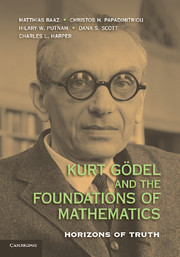Book contents
- Frontmatter
- Contents
- Contributors
- Foreword
- Preface
- Acknowledgments
- Short Biography of Kurt Gödel
- I Historical Context: Gödel's Contributions and Accomplishments
- Gödel's Legacy: A Historical Perspective
- The Past and Future of Computation
- Gödelian Cosmology
- II A Wider Vision: The Interdisciplinary, Philosophical, and Theological Implications of Gödel's Work
- Gödel and the Mathematics of Philosophy
- Gödel and Philosophical Theology
- Gödel and the Human Mind
- III New Frontiers: Beyond Gödel's Work in Mathematics and Symbolic Logic
- The Realm of Set Theory
- Gödel and the Higher Infinite
- 20 The Transfinite Universe
- Gödel and Computer Science
- Index
20 - The Transfinite Universe
Published online by Cambridge University Press: 07 September 2011
- Frontmatter
- Contents
- Contributors
- Foreword
- Preface
- Acknowledgments
- Short Biography of Kurt Gödel
- I Historical Context: Gödel's Contributions and Accomplishments
- Gödel's Legacy: A Historical Perspective
- The Past and Future of Computation
- Gödelian Cosmology
- II A Wider Vision: The Interdisciplinary, Philosophical, and Theological Implications of Gödel's Work
- Gödel and the Mathematics of Philosophy
- Gödel and Philosophical Theology
- Gödel and the Human Mind
- III New Frontiers: Beyond Gödel's Work in Mathematics and Symbolic Logic
- The Realm of Set Theory
- Gödel and the Higher Infinite
- 20 The Transfinite Universe
- Gödel and Computer Science
- Index
Summary
The twentieth-century choice for the axioms of set theory are the Zermelo-Frankel axioms together with the axiom of choice; these are the ZFC axioms. This particular choice has led to a twenty-first-century problem:
The ZFC Dilemma: Many of the fundamental questions of set theory are formally unsolvable from the ZFC axioms.
Perhaps the most famous example is given by the problem of the continuum hypothesis: suppose X is an infinite set of real numbers; must it be the case that either X is countable or that the set X has cardinality equal to the cardinality of the set of all real numbers?
One interpretation of this development is as follows:
Skeptic's Attack: The continuum hypothesis is neither true nor false because the entire conception of the universe of sets is a complete fiction. Furthermore, all the theorems of set theory are merely finitistic truths, a reflection of the mathematician and not of any genuine mathematical “reality.”
Here and in what follows, the “Skeptic” simply refers to the metamathematical position that denies any genuine meaning to a conception of uncountable sets. The counterview is that of the “Set Theorist”:
The Set Theorist's Response: The development of set theory, after Cohen, has led to the realization that formally unsolvable problems have degrees of unsolvability that can be calibrated by large cardinal axioms.
Elaborating further, as a consequence of this calibration, it has been discovered that in many cases, very different lines of investigation have led to problems whose degree of unsolvability is the same.
Information
- Type
- Chapter
- Information
- Kurt Gödel and the Foundations of MathematicsHorizons of Truth, pp. 449 - 472Publisher: Cambridge University PressPrint publication year: 2011
Accessibility standard: Unknown
Why this information is here
This section outlines the accessibility features of this content - including support for screen readers, full keyboard navigation and high-contrast display options. This may not be relevant for you.Accessibility Information
- 16
- Cited by
